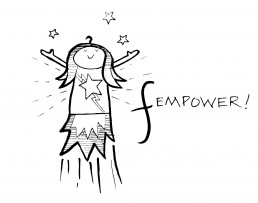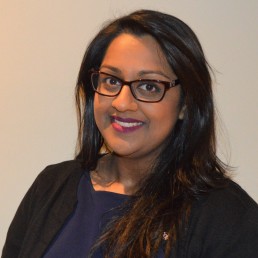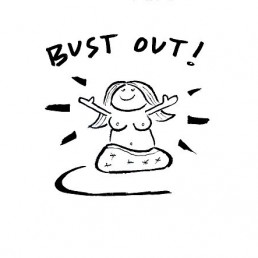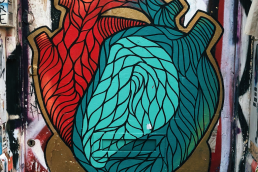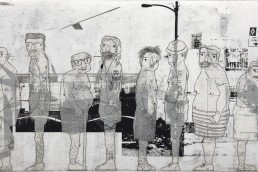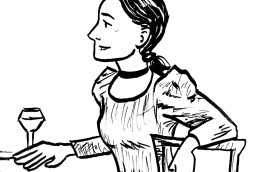Words with Talat Yaqoob | Art by doodlehut
For our Communities issue, we held a Q&A with feminist pioneer Talat Yaqoob who is Director of Equate Scotland (the national expert on gender equality in STEM) and Co-Founder and Chair of Women 50:50 (the national campaign for the fair representation of women in politics and on public boards). If you want to be inspired by a discussion on female empowerment, intersectionality and the importance of self-care when tackling the patriarchy, read on!
Q: The Fearlessly staff are huge fans of the work you’re doing at Women 50:50 and Equate Scotland. For those in our community who haven’t heard of those organisations, can you sum up what you do?
A: All of my work is about the under-representation of women and challenging the status quo that keeps many women locked out of opportunity. Women 50:50 works on women’s involvement, treatment and power in politics and Equate Scotland works on the recruitment, retention and promotion of women in science, engineering, technology and mathematics (STEM). It’s a huge privilege to work on these issues as well as being challenging – the work involves dismantling deeply embedded gender inequalities within our democratic system, within education and within the labour market – as well as championing and supporting women to pursue their ambitions.
Q: As a feminist organisation in a world where many people are yet to realise how patriarchy damages everyone – women, men and non-binary people – the team at Fearlessly are often asked why we’ve adopted a feminist lens to examine mental health. Do you think that mental health has a gendered dimension?
A: I absolutely believe there is a gendered, feminist dimension to mental health. If we look at mental ill-health in women and girls, much (though not all) is influenced by unrealistic expectations; this can be in terms of our appearance and it can be in terms of how much work women are expected to do both in the home and in employment. It is therefore not surprising that a disproportionate number of those who suffer from anxiety, depression and eating disorders are women. There is also a feminist interpretation of men’s mental ill-health; reaching out to talk and seeking support has been deemed “feminine” and therefore, in the patriarchy we exist in, wrongly considered as weak. As a result, toxic masculinity and unfair expectations in society prevent men from coming forward to seek the support they are entitled to. Seeking support is a sign of strength and courage, not weakness.
Q: In your own words, how would you define a ‘feminist community’? What is the shape and purpose of such a community and who might this include?
A: For me, a feminist community is one which understands the struggle and the burn-out that can be experienced as a feminist and activist. A community which understands and supports each other, knows that not every feminist can fight every battle against patriarchy and that we all deserve time to stop, recover and prioritise our wellbeing, whilst other feminists fight in our place. It is a community which takes self-care seriously and is non-judgemental. Critically, it is a community which is truly intersectional and inclusive; operating without hierarchy, understanding and taking action on the reality that women will have multiple and differing oppressions they are fighting, and that whilst these oppressions may not be a shared experience of all, it is a shared fight for social justice of all.
Q: What or who inspired you to become a feminist advocate?
A: I get asked this a lot, and I would love to give you a neat answer but I don’t have one! I think there were multiple factors as I grew up which influenced who I became. The books I accidently happened to read by phenomenal feminist women of colour, being surrounded by older sisters, witnessing inequality and hypocrisy within society and the traditional culture I grew up around. All of this had a drip-drip-drip effect until I got to my late teens and started to actively be involved in political feminist activity.
Q: Why is it so important to have equal gender representation in politics, business, the third sector and areas such as STEM? How might this improve our wellbeing?
A: Equal representation is really about equal access to decision-making, to opportunity and power. The over-representation of men in politics and in STEM has significant consequences. In politics it means women are missing from decisions impacting every part of their lives. It means women’s lived experiences are not being considered when policies are being developed. The consequences can be seen in today’s policy-making where austerity has had a disproportionate and negative impact on women. In STEM it means that innovation in healthcare, in technology or in engineering feats are not made with diverse minds and often do not consider women’s needs. We can see this in a whole range of areas, for instance, medical diagnosis and pharmaceuticals, where the symptoms and treatment of a heart attack although well-known for most men, can differ substantially for women. Equal representation is about much more than simple numbers or visibility.
Q: What are the biggest obstacles to achieving gender equality right now, and how can like-minded organisations and individuals help overcome them?
A: Some of the obstacles are the same as they have always been; people who have power and don’t want to share it, whether that is political, economic or cultural power. The way like-minded people can help overcome these obstacles is by joining feminist organisations and campaigning for the fair redistribution of this power to more, diverse women, those who are campaigning to challenge and change the institutionalised inequalities in our systems. I think the most helpful thing we can all do is consider where we can insert feminism into our daily, personal and professional lives, how we can make feminist thinking the norm. The sooner we do that, the sooner we win change.
Q: Self-care is a bit of a buzzword right now, but we think it’s so important. What (if anything) do you do to take care of yourself and your mental wellbeing, as a person who must have such a huge workload?
A: You deserve my honesty! I talk a good game about self-care but I don’t do enough of it. I need to take my own advice more and I think many feminist activists are probably in a similar position. What I have started to do is put a cap on social media at the weekend (you don’t need a 24/7 bad news cycle). I watch feel-good TV and movies that make me laugh. I love getting lost in a good book and catching up with friends, drinking tea and putting the world to rights. I also love my bed; weekend naps might actually be my favourite pastime…
Q: As you know, this issue of Fearlessly is all about communities and mental health. Can you tell us about a time when being part of a particular community significantly helped your mental health? And have there been any times when you felt a community has had a negative impact on your wellbeing?
A: My feminist sisterhood has been my saving grace many times. I remember one particular moment; it was December 2016, Trump had just been elected and I was feeling very low and overwhelmed about the state of the world. So to create some support I organised a feminist night off. I invited my feminist pals who felt similarly to watch a movie and have a night off and said to invite anyone who needed this space. On the night we ended up with almost 60 of us squeezed into a room with a projector, all there to support one another and feel better. It was genuinely wonderful.
Q: If you could affect change in any area of law or government policy that you think would make the most positive difference to the mental wellbeing of young adults, what would that change be?
A: It is right that we campaign and work on tackling stigma and encourage people to talk about their mental wellbeing, but once we get someone to consider talking, where are they meant to go? Most services have long waiting times; the target itself is to be seen within 18 weeks. This is a painfully long time for someone struggling. We need serious investment in services and we need services to be local and diverse; so, able to adequately respond to the needs of Scotland’s women, communities of colour, migrant communities, LGBT communities, older people and young, disabled people, carers and working-class communities. Anyone can have a mental illness, therefore everyone needs appropriate access to high-quality support.
Talat Yaqoob
Talat Yaqoob is Director of Equate Scotland, the national expert on gender equality in STEM (science, technology, engineering and mathematics), Co-Founder and Chair of Women 5050, the national campaign for fair representation of women in politics and on public boards and Member of the National Advisory Council on Women and Girls. She has a background in public affairs, campaigning, social research and training and development across equalities issues. Talat has managed a number of projects in the Third Sector, including on mental wellbeing, education rights, international health development, women’s representation in politics and tackling violence against women. She has also worked in the Scottish Parliament, focusing on policy and research for a political party, and as a consultant for organisations focused on social equality and community engagement.
Doodlehut
Doodlehut produces quick cartoons, aimed at absolutely anyone. The drawings are usually conceived fast – from a sudden thought, a word, an overheard chat or from a place of silence in the mind. It’s about getting to the heart of something. Playing with words or a wisdom nugget. Often with a lick of humour and as minimally as absolutely possible. Inspired by Zen calligraphy. Female empowerment is a great theme of life.

